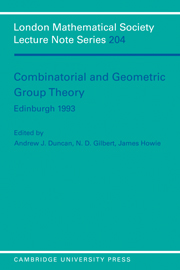Book contents
- Frontmatter
- Contents
- Foreword
- Participants
- On bounded languages and the geometry of nilpotent groups
- Finitely presented groups and the finite generation of exterior powers
- Semigroup presentations and minimal ideals
- Generalised trees and Λ-trees
- The mathematician who had little wisdom: a story and some mathematics
- Palindromic automorphisms of free groups
- A Freiheitssatz for certain one-relator amalgamated products
- Isoperimetric functions of groups and exotic cohomology
- Some embedding theorems and undecidability questions for groups
- Some results on bounded cohomology
- On perfect subgroups of one-relator groups
- Weight tests and hyperbolic groups
- A non-residually finite, relatively finitely presented group in the variety N2A
- Hierarchical decompositions, generalized Tate cohomology, and groups of type (FP)∞
- Tree-lattices and lattices in Lie groups
- Generalisations of Fibonacci numbers, groups and manifolds
- Knotted surfaces in the 4-sphere with no minimal Seifert manifolds
- The higher geometric invariants of modules over Noetherian group rings
- On calculation of width in free groups
- Hilbert modular groups and isoperimetric inequalities
- On systems of equations in free groups
- Cogrowth and essentiality in groups and algebras
- Regular geodesic languages for 2-step nilpotent groups
- Finding indivisible Nielsen paths for a train track map
- More on Burnside's problem
- Problem Session
A Freiheitssatz for certain one-relator amalgamated products
Published online by Cambridge University Press: 05 April 2013
- Frontmatter
- Contents
- Foreword
- Participants
- On bounded languages and the geometry of nilpotent groups
- Finitely presented groups and the finite generation of exterior powers
- Semigroup presentations and minimal ideals
- Generalised trees and Λ-trees
- The mathematician who had little wisdom: a story and some mathematics
- Palindromic automorphisms of free groups
- A Freiheitssatz for certain one-relator amalgamated products
- Isoperimetric functions of groups and exotic cohomology
- Some embedding theorems and undecidability questions for groups
- Some results on bounded cohomology
- On perfect subgroups of one-relator groups
- Weight tests and hyperbolic groups
- A non-residually finite, relatively finitely presented group in the variety N2A
- Hierarchical decompositions, generalized Tate cohomology, and groups of type (FP)∞
- Tree-lattices and lattices in Lie groups
- Generalisations of Fibonacci numbers, groups and manifolds
- Knotted surfaces in the 4-sphere with no minimal Seifert manifolds
- The higher geometric invariants of modules over Noetherian group rings
- On calculation of width in free groups
- Hilbert modular groups and isoperimetric inequalities
- On systems of equations in free groups
- Cogrowth and essentiality in groups and algebras
- Regular geodesic languages for 2-step nilpotent groups
- Finding indivisible Nielsen paths for a train track map
- More on Burnside's problem
- Problem Session
Summary
Introduction
Suppose G = 〈x1, …, xn; R = 1〉 is a one-relator group with R a cyclically reduced word in the free group on {x1,…,xn} which involves all the generators. The classical Freiheitssatz or independence theorem of Magnus (see [25]) asserts that the subgroup generated by any proper subset of the generators is free on those generators. More generally suppose X and Y are disjoint sets of generators and suppose that the group A has the presentation A = 〈X; rel(X)〉 and that the group G has the presentation G = 〈X,Y;rel(X),Rel(X,Y)〉. Then we say that G satisfies a Freiheitssatz relative to A if < X >G= A, that is the subgroup of G generated by X is isomorphic to A. In this more general language Magnus' result says that a one-relator group satisfies a Freiheitssatz relative to the free group on any proper subset of generators.
A great deal of work has gone into proving the Freiheitssatz for the class of one-relator products. These are groups of the form G = (A * B)/N(R) where R is a non-trivial,cyclically reduced word in the free product A * B of syllable length at least two. A and B are called the factors and R is called the relator. In this case the Freiheitssatz means that A and B inject into G.
- Type
- Chapter
- Information
- Combinatorial and Geometric Group Theory, Edinburgh 1993 , pp. 73 - 86Publisher: Cambridge University PressPrint publication year: 1994



